Socially-Engaged Ethnomusicology: Power, Community, and Collaborative Knowledge Production in the UNESCO World Heritage Site of George Town, Penang
Lecture by Tan Sooi Beng, Ph.D.
Professor of Ethnomusicology
The School of Arts, Universiti Sains Malaysia (USM), Penang
Recent debates in applied ethnomusicology and critical heritage studies illustrate that music, the performing arts, and other forms of Intangible Cultural Heritage (ICH) are socially created and have political dimensions (Diamond and Castelo-Branco, 2021; Hermetek et al, 2019). As such, ICH is continually being appropriated by hegemonic structures of power such as global organizations, nation states, universities, business corporations as well as local associations led by elites who intervene in heritage making following their own agendas. Yet, as “living heritage embodied in people” (UNESCO, 2003), ICH forms the foundation of the evolving cultural identities of local communities. As a consequence, conflicts and contestations occur between different groups over the ownership of ICH and how art forms are to be represented and conserved (Langfield et al 2016; Hall, 1997). Following this discourse, sustaining ICH in their own terms becomes a human right of the local communities and community engagement a necessity in ethnographic research (Schippers and Grant 2016; Lassiter, 2021). Ethnomusicologists and heritage practitioners have begun to engage in reflexivity regarding their roles as researchers and to make critical shifts in their approaches in research such as including tradition bearers as equal collaborative partners in the production and dissemination of knowledge (Titon, 2015; Araujo et al, 2006). This paper continues the dialogue as it deliberates the complex intersections between knowledge production and transmission, community engagement, and power-related issues that affect the heritage bearers and the sustainability of their ICH in George Town, a UNESCO World Heritage site based in Penang, Malaysia. Tan Sooi Beng discusses the bottom-up strategies used to engage the diverse local communities to actively identify, interpret, manage, and perform their ICH as well as to pass them to the younger generation through the annual Heritage Celebrations and other performing art revitalization projects in the city.
Tan Sooi Beng (Ph.D) is Professor of Ethnomusicology at the School of the Arts, Universiti Sains Malaysia (USM), Penang. She is the author of Bangsawan: A Social and Stylistic History of Popular Malay Opera (Oxford University Press, 1993), and co-author of Music of Malaysia: Classical, Folk and Syncretic Traditions (Routledge, 2017); and Longing for the Past, the 78 RPM Era in Southeast Asia (Dust-to-Digital 2013), which won the joint SEM Bruno Nettl Prize, 2014. She also co-authored a multimedia book and box set on the Potehi of Penang (George Town World Heritage Incorporated, 2017) and edited the book Eclectic Cultures for All: The Development of the Peranakan Performing, Visual and Material Arts in Penang (USM, 2019). Tan serves in the Advisory Editorial Board of Asian Music (USA) and is an elected Vice-President of the International Council for Traditional Music (ICTM). She is an advocate of activist ethnomusicology and is engaged in the practice of community theatre for young people and the organization of community festivals in Penang, where she lives and works.
Part of the Nazir Ali Jairazbhoy Colloquium Series, this event is sponsored by The UCLA Herb Alpert School of Music Department of Ethnomusicology, with support from the Dean of the UCLA Herb Alpert School of Music.
